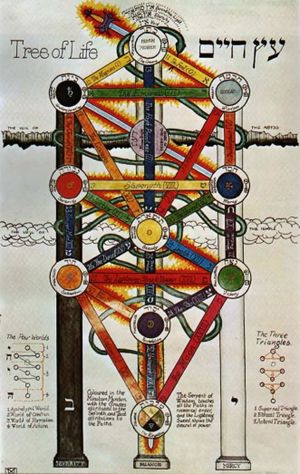Pillar of Mildness

The Pillar of Mildness (Hebrew: גסת Gusuth) is the middle of the three Pillars of Manifestation in the Tree of Life of the Kabbalah. It mediates between the right, white pillar Jachin and the left, black pillar Boaz. The Pillar of Mildness is not explicitly shown in many depictions of the Tree of Life, but is only ideally present.
Of the three mothers - these are the Hebrew letters Aleph (Hebrew: א), Mem (Hebrew: מ) and Shin (Hebrew: ש), which also stand for soul, body and spirit - Shin is assigned to the right, white pillar Jachin, Aleph to the middle pillar of Mildness and Mem to the left, black pillar Boaz.
The 10 Sefirot are arranged on both sides of the Tree of Life as pairs of opposites, which find their balance on the middle axis. The right side corresponds to the perfection of the universe, the left side brings division, which makes the outer creation possible in the first place, but at the same time is also the origin of strife and ultimately leads down to hell. The Zohar says in this regard:
„And God said, "Let there be a parting in the midst of the waters!" Here follows in particular the mystery of the separation of the upper and lower waters: in the sign of the left side. For this stands in the mystery of division, whereas until then only the mystery of the right side had been spoken of. The right, however, signifies the perfection of the universe and is therefore called by the name "All", because all perfection depends on it. The awakening of the left is the awakening of strife; and in this strife the fire of wrath comes to the fore. Thus from that strife hell has its origin, which awakens on the left side and remains attached to it. . . The wisdom of Moses perceived this and thus gained insight into the work of creation: how in this work itself already lies the strife of the left against the right and how from this strife, in that the left comes to revival, hell also takes its origin. But then the middle pillar, that is the third day, unites with both, steps between them and settles the dispute and reconciles the two sides. Through this, hell descends, the left is completed on the right, and peace is achieved in everything.“ (Lit.: Sohar, p. 110)
In the middle, mediating pillar, the reconciling Christ principle already announces itself, which also appears in a similar way in the Revelation of John in the image of the fourth apocalyptic seal.
Literature
- Ernst Müller (editor, translator): Der Sohar - Das heilige Buch der Kabbala, Heinrich Hugendubel Verlag, Kreuzlingen/München 2005
- Rudolf Steiner: Bilder okkulter Siegel und Säulen. Der Münchner Kongreß Pfingsten 1907 und seine Auswirkungen., GA 284 (1993), ISBN 3-7274-2840-6 English: rsarchive.org German: pdf pdf(2) html mobi epub archive.org
 |
References to the work of Rudolf Steiner follow Rudolf Steiner's Collected Works (CW or GA), Rudolf Steiner Verlag, Dornach/Switzerland, unless otherwise stated.
Email: verlag@steinerverlag.com URL: www.steinerverlag.com. Index to the Complete Works of Rudolf Steiner - Aelzina Books A complete list by Volume Number and a full list of known English translations you may also find at Rudolf Steiner's Collected Works Rudolf Steiner Archive - The largest online collection of Rudolf Steiner's books, lectures and articles in English. Rudolf Steiner Audio - Recorded and Read by Dale Brunsvold steinerbooks.org - Anthroposophic Press Inc. (USA) Rudolf Steiner Handbook - Christian Karl's proven standard work for orientation in Rudolf Steiner's Collected Works for free download as PDF. |
